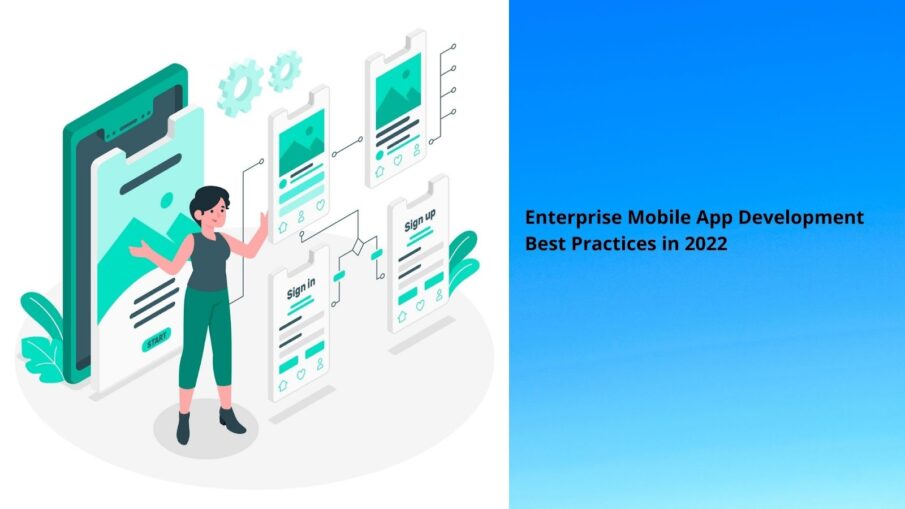What are the best practices for developing enterprise mobile apps in 2022?
Mobile app Development has made consumers more powerful and helped businesses communicate with consumers and convert business more easily. Mobile apps also helped businesses run their operations smoothly and helped one business communicate with other businesses for meaningful output. Enterprise mobile apps refer to these apps focused on “within the company” and “company to company” communication and collaboration.
Some major players catering to enterprise requirements such as Enterprise Resource Planning (ERP), Customer Relationship Management (CRM), Financial & Operations (F&O), Supply Chain Management (SCM), Inventory and Warehouse Management, etc. have now started to make their traditional software solutions turn to mobile platforms. Thus from Oracle Netsuite to SAP to Amazon Web Services (AWS) all have now developed their app versions accessible from iOS and Android platforms.
If, for your company, you want to build a robust enterprise app that can help you automate many processes besides staying in touch with your workforce all the time, you need to have a clear idea about the evolving trends in enterprise app development. Based on the experience of many app projects over the years, we will shed some light on the enterprise mobile app development best practices to follow in 2022.
Uncompromising app security
Enterprise apps have become soft targets of cybersecurity threats and fraudulent activities more than ever before. The security threats continue to get tougher and more agile thanks to their exposure to the latest technologies and many loopholes. For example, enterprises that embraced widespread mobile access for business processes are increasingly suffering from security risks and loopholes. Instead of relying on multiple apps for carrying out business tasks, Enterprise mobile apps can deliver features and functionalities for a more unified and secure business operation through just one app.
App security in the case of enterprises is also vulnerable because of the multitude of devices belonging to different ecosystems and their underlying security loopholes and risks. The hackers are also more apt to break through the security layers through powerful bot attacks. The well-orchestrated bot attacks that often leave the app security vulnerable is a major cause of data loss and misappropriation of user identities.
This is why enterprise apps must prioritize security more than anything else. Enterprise apps need to use powerful Machine Learning-based algorithms to easily detect user behavior anomalies and unusual patterns. Using a Blockchain-based decentralized database to prevent data tampering and manipulation can be highly effective for enterprise apps. Using biometric authentication for employees and enforcing strict role-based data access are other two measures for robust app security.
Streamlined app updates
Another important thing for enterprise mobile apps is regularly ensuring faster and more streamlined updates. Because of the enhanced security vulnerabilities and risks in the case of enterprise apps, rolling out security updates and updates for eradicating performance glitches is extremely important for enterprise apps.
All app updates should be instantly and automatically available to all users across all platforms, leaving no scope for missing out on any update. Enterprise app updates made available for everyone within the organization at the same time will ensure making collaboration easier.
Enterprise apps should accommodate smooth third-party integration
Despite offering all the business-specific features and functionalities, Enterprise mobile apps cannot just do away with the third-party legacy software systems that are already in use. For example, if your company is already using legacy accounting software or spreadsheet software, you may not switch to the new app just overnight.
This is why enterprise mobile apps must allow smooth integration of third-party software. Besides allowing smooth integration, the enterprise app should also facilitate easy and streamlined data transfer from the legacy software to the new app.
Powerful dashboard and data analytics
Most powerful and well-acclaimed enterprise software solutions come with robust dashboards to provide quick access to different datasets and operational tasks. Real-time access through the dashboard to all business data across multiple operational facets will ensure optimum efficiency.
The inbuilt data analytics for diverse parameters and operational areas will further strengthen the enterprise management for data-driven decision making. Enterprise apps must give priority to integrating powerful analytics engines to provide real decision-making-time access to data analytics.
Offline access
This is a particularly important feature for all enterprise apps that remote or on-field employees use. Companies particularly handling large field staff teams must ensure providing offline access to some app content and features. In areas where network connection is poor, offline access can ensure the staff uses the app so that as soon as the network connection is restored, the data is updated instantly.
Offline access to certain app content and features will help employees in many sectors to keep all the crucial information and processes tuned. They can continue working without the Internet, and the data will be updated with the time and date stamp when connectivity is restored.
Business process automation
Enterprise apps have become the vessels for driving business process automation in many industries. Mobile enterprise apps can help streamline several different processes and operational procedures as all employees stay in sync with the app’s core business data and operational processes.
Multiple business processes ranging from warehousing and inventory to the sales channel to sales and marketing can remain in sync in real-time, allowing wider collaboration and real-time visibility, thanks to app-based business automation.
Integrating cloud storage
Most businesses consider maintaining on-premise data storage cumbersome and problematic. Most businesses are now turning to cloud storage and cloud-enabled computing for a smooth and streamlined operation. Enterprise apps must take advantage of the cloud computing opportunity and should integrate the cloud.
Summing It Up
Enterprise mobile apps became the new battlefield for driving business conversion through innovations. Naturally, for developing mobile apps for enterprise operation, one needs to be more circumspect and focused than regular apps. The above-mentioned best practices have been successfully tried and tested through leading enterprise mobile apps.
